
AKTUELLE RHEUMATOLOGIE
Scope & Guideline
Empowering professionals with cutting-edge rheumatology insights.
Introduction
Aims and Scopes
- Exploration of Disease Mechanisms:
The journal emphasizes research that investigates the underlying mechanisms of various rheumatic diseases, aiming to uncover novel pathophysiological insights that can inform treatment strategies. - Clinical Trials and Treatment Efficacy:
AKTUELLE RHEUMATOLOGIE publishes studies evaluating the efficacy and safety of new and existing therapies for rheumatic conditions, including biologics and traditional disease-modifying antirheumatic drugs (DMARDs). - Patient-Centered Research:
The journal features research on patient outcomes, quality of life, and the psychosocial aspects of living with rheumatic diseases, highlighting the importance of patient perspectives in clinical practice. - Comorbidities and Risk Factors:
Research on the comorbidities associated with rheumatic diseases, including cardiovascular risks and mental health issues, is a core focus, emphasizing the need for comprehensive care approaches. - Innovative Diagnostic Approaches:
The journal encourages studies that advance diagnostic methods, including imaging techniques and biomarkers, to improve early detection and monitoring of rheumatic diseases. - Interdisciplinary Collaboration:
AKTUELLE RHEUMATOLOGIE promotes interdisciplinary approaches, integrating insights from various medical fields to enhance the management of rheumatic diseases.
Trending and Emerging
- Telemedicine and Digital Health:
There is a notable increase in studies exploring telemedicine and digital health interventions, particularly in response to the COVID-19 pandemic, emphasizing their role in enhancing patient care and accessibility. - Microbiome Research in Rheumatology:
An emerging focus on the relationship between the microbiome and rheumatic diseases is evident, with research investigating how gut health may influence disease activity and treatment responses. - Gender Differences in Rheumatic Diseases:
Recent papers are increasingly addressing the impact of gender on disease presentation, treatment efficacy, and outcomes, acknowledging the necessity of gender-sensitive approaches in rheumatology. - Personalized Medicine and Biomarkers:
Research on personalized medicine, including the identification of biomarkers for predicting disease progression and treatment responses, is gaining traction, reflecting a shift towards individualized patient care. - Socioeconomic Factors in Disease Management:
There is a growing interest in understanding how socioeconomic factors affect disease management, treatment adherence, and health outcomes in patients with rheumatic diseases.
Declining or Waning
- Traditional Treatment Modalities:
Research on conventional therapies, such as older DMARDs, appears to be waning as the field shifts towards biologics and targeted therapies, reflecting a growing emphasis on innovative treatment options. - Historical Perspectives:
Papers focusing on the historical aspects of rheumatology, while still valuable, are becoming less frequent as contemporary clinical research takes precedence in the journal's publications. - Generalized Pain Management Strategies:
Studies that provide broad, non-specific pain management strategies are declining in favor of more tailored, disease-specific approaches that address the unique needs of patients with rheumatic diseases. - Basic Science Research:
There seems to be a diminishing interest in purely basic science research without direct clinical implications, as the journal increasingly prioritizes studies that bridge the gap between laboratory findings and clinical application.
Similar Journals

RHEUMATIC DISEASE CLINICS OF NORTH AMERICA
Empowering clinicians with comprehensive, evidence-based articles.Rheumatic Disease Clinics of North America is a premier journal published by W B Saunders Co-Elsevier Inc, dedicated to advancing the field of rheumatology through comprehensive and impactful research. With an ISSN of 0889-857X and an E-ISSN of 1558-3163, this esteemed publication has been disseminating knowledge since its inception in 1987, and continues to guide clinicians and researchers alike through its insightful articles and case studies. Positioned in the 2023 Q2 quartile for Rheumatology, it ranks #31 out of 73 journals in the Scopus category of Medicine _ Rheumatology, reflecting a commendable impact factor and relevance in the academic community. Although it does not offer open access options, the journal ensures that subscribers have access to cutting-edge research and reviews that address contemporary challenges and advancements in rheumatic disease. With its authoritative content, Rheumatic Disease Clinics of North America serves as a vital resource for those striving to improve patient care and clinical outcomes in the ever-evolving landscape of rheumatology research.
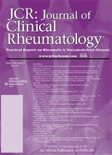
JCR-JOURNAL OF CLINICAL RHEUMATOLOGY
Transforming Rheumatology Through Peer-reviewed ExcellenceJCR-Journal of Clinical Rheumatology, published by Lippincott Williams & Wilkins, is a premier outlet dedicated to the field of rheumatology, recognized for its contributions and relevance among medical journals. Boasting an impact factor reflective of its vital role in disseminating innovative research, it currently holds a Q2 category ranking in Medicine (miscellaneous) and a Q3 ranking in Rheumatology as of 2023. With its convergence years spanning from 1995 to 2024, the journal aims to foster the advancement of knowledge in clinical practices, therapeutic advances, and patient management strategies concerning rheumatic diseases. Researchers, professionals, and students can access a wealth of benchmark studies and peer-reviewed articles, enhancing their understanding and collaboration within this dynamic field. By bridging clinical insights with rigorous research, the JCR-Journal of Clinical Rheumatology remains an important resource for advancing the understanding of rheumatologic disorders and improving patient care.

ZEITSCHRIFT FUR RHEUMATOLOGIE
Enhancing patient care with groundbreaking rheumatology insights.ZEITSCHRIFT FUR RHEUMATOLOGIE, published by Springer Heidelberg, serves as a vital platform in the field of rheumatology, providing researchers, clinicians, and students with cutting-edge findings and discussions related to the diagnosis, treatment, and management of rheumatic diseases. Since its inception in 1974 and continuing until 2024, this journal retains its commitment to disseminating significant scientific work within this specialized domain. Although it is currently categorized in the Q4 quartile for Rheumatology and ranks 47 out of 73 in Scopus, reflecting its burgeoning presence, the journal is dedicated to evolving and gaining prominence in the academic community. By offering valuable insights and fostering scholarly discourse, ZEITSCHRIFT FUR RHEUMATOLOGIE plays a crucial role in advancing rheumatology research and enhancing patient care practices worldwide. The journal presents an opportunity for its readers to engage with contemporary studies and enrich their understanding of rheumatic ailments.

Pediatric Rheumatology
Connecting global experts to elevate pediatric health research.Pediatric Rheumatology is a leading peer-reviewed open access journal published by BMC, dedicated to disseminating high-quality research in the field of pediatric rheumatology. Since its inception in 2007, the journal has established itself as a vital resource for healthcare professionals, researchers, and students focused on pediatric immunology, rheumatology, and child health, maintaining an impressive Q1 ranking in Pediatrics and Q2 in Immunology and Allergy as well as Rheumatology for 2023. It is recognized for its impact on advancing knowledge and clinical practice, with significant contributions noted in various studies and case reports. With access options that embrace the ethos of open science, all articles published in Pediatric Rheumatology are freely available, promoting collaborative research and discussion among practitioners across the globe. The journal welcomes submissions that encapsulate innovative research, clinical trials, and reviews that address both current challenges and advancements within the pediatric rheumatology landscape.
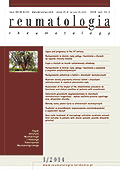
Reumatologia
Fostering collaboration in the fields of Immunology and Rheumatology.Reumatologia is a dedicated open-access journal published by TERMEDIA PUBLISHING HOUSE LTD that has been serving the global scientific community since 2005. The journal focuses on the fields of Rheumatology, Immunology, and Allergy, providing a rich platform for researchers and practitioners to share innovative findings, clinical insights, and methodologies. With its roots tracing back to the early 1960s and a steady convergence of quality content through 2024, Reumatologia has secured a place in the academic landscape, currently holding a Q4 rating in Immunology and a Q3 rating in both Immunology and Allergy and Rheumatology categories for 2023. While the journal ranks #42 out of 73 in the Medicine - Rheumatology category, its open-access model ensures that research is widely disseminated, enhancing visibility and accessibility to vital knowledge that shapes therapeutic practices. Located in Poznan, Poland, Reumatologia remains a pivotal source of credible research, fostering collaboration among academics, healthcare professionals, and students internationally.
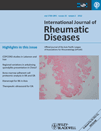
International Journal of Rheumatic Diseases
Exploring innovations in rheumatic disease management.The International Journal of Rheumatic Diseases, published by WILEY, serves as a crucial platform for disseminating high-quality research and advancements in the field of rheumatology. With an ISSN of 1756-1841 and an E-ISSN of 1756-185X, this journal has established itself within the academic community since its inception in 2008, and it is set to continue until at least 2024. Positioned in the Q3 category of rheumatology, the journal holds a significant rank of #38 out of 73 in its field according to Scopus, showcasing its growing influence despite the competitive environment. The absence of Open Access reflects a traditional scholarly publishing model, allowing for meticulous peer-review processes to ensure the rigor and reliability of published studies. This journal aims to foster innovative research, critical reviews, and clinical studies, thereby contributing to a deeper understanding of rheumatic diseases and enhancing patient care. The dedicated readership, including researchers, healthcare professionals, and students, will find valuable insights into the latest findings and methodologies relevant to rheumatology in the journal's comprehensive articles.
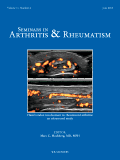
SEMINARS IN ARTHRITIS AND RHEUMATISM
Elevating research standards in arthritis and rheumatism.SEMINARS IN ARTHRITIS AND RHEUMATISM, published by W B Saunders Co-Elsevier Inc, is a leading journal in the fields of rheumatology and pain medicine. With an impressive impact factor and recognized as a Q1 journal in both its categories, it ranks #8 in Anesthesiology and Pain Medicine and #11 in Rheumatology based on the latest Scopus data, placing it within the top echelons of academic research. Established in 1971, this esteemed publication offers a comprehensive platform for researchers and practitioners to disseminate and engage with cutting-edge studies that advance the understanding and treatment of arthritis and related conditions. With its robust editorial process and focus on high-quality, peer-reviewed articles, the journal not only contributes to scientific knowledge but also serves as an essential resource for professionals and students seeking contemporary insights into effective management strategies and emerging therapies in the rheumatologic field. Although it does not offer open access, its subscription model ensures a wide distribution among academic and clinical institutions, reinforcing its significance in the research community.

Archives of Rheumatology
Empowering researchers to reshape rheumatic disease management.Archives of Rheumatology is a premier peer-reviewed journal dedicated to advancing the field of rheumatology through the dissemination of high-quality research, reviews, and case studies. Published by the Turkish League Against Rheumatism, this open-access journal provides a platform for researchers, clinicians, and students to share insightful findings and innovative approaches in the diagnosis and management of rheumatologic diseases. With the goal of promoting knowledge exchange on a global scale, the journal welcomes submissions that enhance understanding and foster advancements in the clinical and biological aspects of rheumatic conditions. Each publication contributes significantly to the growing body of literature in this vital field of medicine, making Archives of Rheumatology an essential resource for both established and emerging researchers looking to stay abreast of the latest developments and clinical practices.
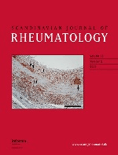
SCANDINAVIAN JOURNAL OF RHEUMATOLOGY
Connecting Scholars to Transform Rheumatological CareThe Scandinavian Journal of Rheumatology, published by Taylor & Francis Ltd, is a prestigious peer-reviewed journal dedicated to advancing research in the fields of rheumatology, immunology, and related disciplines. With an ISSN of 0300-9742 and an E-ISSN of 1502-7732, this journal has established itself as a vital platform for disseminating significant findings and innovative approaches in the management of rheumatic diseases since its inception in 1959. As a recognized scholarly outlet, it currently resides within the Q2 category for Medicine (miscellaneous) and ranks #39 out of 73 in Rheumatology according to the 2023 Scopus assessments. This reflects the journal's commitment to high-quality research and its relevance in the scientific community. Although it does not provide Open Access options, the journal's rigorous selection process ensures that only the most impactful research reaches its audience, making it a crucial resource for researchers, clinicians, and students engaged in the exploration of rheumatological and immunological challenges. The journal's broad scope encompasses ongoing studies, clinical trials, and reviews that aim to enhance understanding and treatment of rheumatic conditions, promoting collaboration and knowledge-sharing among professionals in the field.
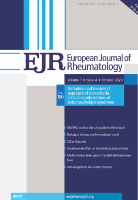
European Journal of Rheumatology
Transforming Research into Real-World SolutionsEuropean Journal of Rheumatology is a premier, peer-reviewed journal that has been paving the way for innovative research and in-depth analysis in the field of rheumatology since its launch. Published by AVES, this Open Access journal has been accessible to researchers, professionals, and students worldwide since 2014, promoting the sharing of valuable knowledge on rheumatic diseases and their treatment. With an ISSN of 2147-9720 and an E-ISSN of 2148-4279, it provides a prominent platform for groundbreaking studies and clinical evaluations that bridge scientific discovery with practical application. The journal’s mission is to enhance the understanding of rheumatological conditions and facilitate advancements in therapeutic strategies, making it an essential resource for anyone devoted to the improvement of patient care in this dynamic field. The European Journal of Rheumatology is committed to upholding the highest standards of scholarly publishing and aims to foster collaboration among researchers and practitioners across Europe and beyond.